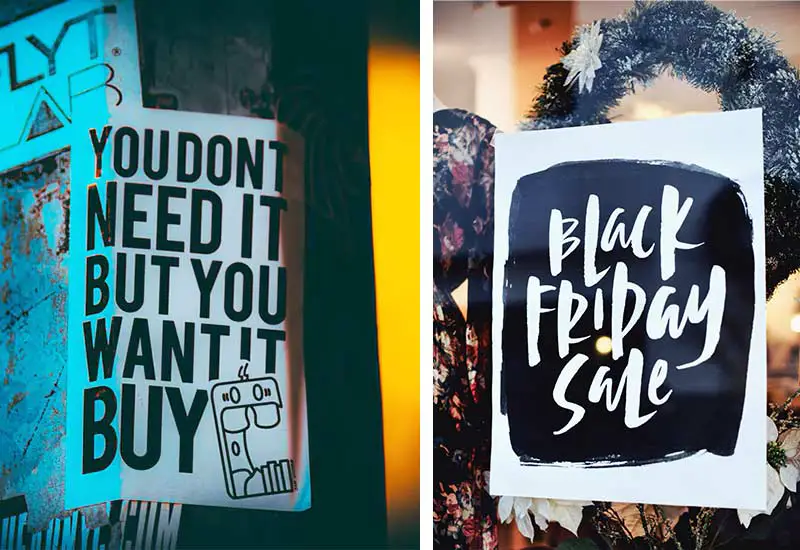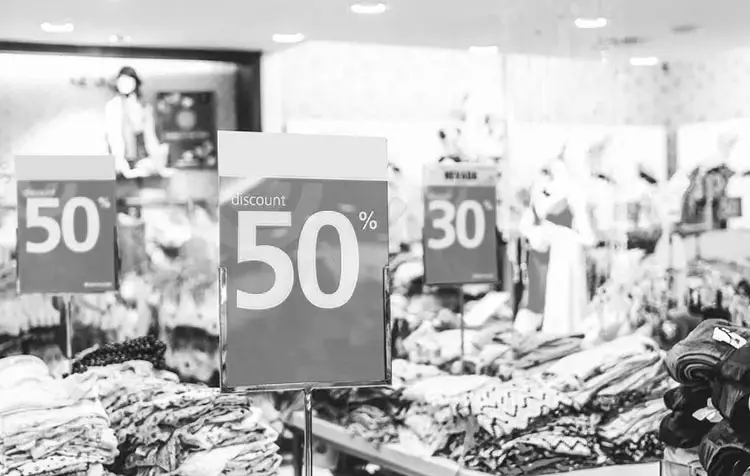Want to know what Black Friday is and what it means for environmental protection and sustainability? Then you've come to the right place! Black Friday, the last Friday in November, has become a tradition in Germany: It is considered an annual highlight for shoppers. Countless online stores and brick-and-mortar stores reduce their stocks around this day - and drastically at that. What makes shoppers' hearts beat faster, however, rightly worries environmental organizations.
In this article, you'll find out what the bargain holiday is all about, why it's performing so poorly in terms of sustainability, and what alternatives environmentally conscious consumers have. Let's go!
What is Black Friday anyway?
In the USA, Black Friday heralds the start of the Christmas shopping season. It falls every year on the last Friday in November and thus on the day following Thanksgiving. Many people use it as a bridge day and take this opportunity to do their first Christmas shopping. Retailers recognized this early on and began lowering prices on this day decades ago. In Germany, the event has only been known for a few years - but is all the more popular for it. Whether online or offline, there is hardly a retailer left who does not take part.
Where does the name "Black Friday" come from? It's controversial: some think it stems from the crowds of people who storm the stores on this day, others associate it with the black numbers that keep the cash registers ringing at closing time. What is certain, however, is that the savings day for shoppers was first called Black Friday in 1966.
Good to know: However, the sentence in question, in which the term was dropped, was not positive. Bonnie Taylor-Blake, a member of the American Dialect Society, a scholarly society, complained about the "massive traffic jams and crowded sidewalks" and the "beleaguered stores in downtown" Philadelphia.
Black Friday and sustainability - why don't they go together?

Taylor-Blake was very successful with her Criticism of "Black Friday a pioneer. Not everyone reports positively about Black Friday - especially against the backdrop of the Climate changewhich is not least the result of steadily growing consumption, our Disposable society and the increasing consumption natural resources is. In addition, there is a fortunately increasing sensitivity to issues such as sustainability and environmental protection. Word has spread that the purchase of new goods has a negative impact on the climate and our planet.
The reasons for this are manifold. For example, the production of goods blows immense amounts of CO2 into the atmosphere and devours valuable raw materials. This applies to goods of every kind - from clothing to electronics. For example, the production of one pair of jeans alone requires around 8,000 liters of water.₁ The production of electronic products such as smartphones also has drastic consequences for environmental protection.₂
For microchips and other components, so-called Rare earths required. They describe a group of metals, some of which are used under catastrophic and inhuman conditions that are not to be associated with sustainability and environmental protection.
And it's not just production that gobbles up raw materials and increases CO2 emissions. Also the Transport of the goodsfrom the manufacturer to the stores and on to the consumers causes emissions. In addition, there are the returns, lighting, ventilation and heating required in the stores - and the shoppers also have to reach the stores. Those who travel downtown in their own car for Black Friday can add more negative points to their ecological footprint list.
Tip: How you Avoid returns in general you can find out here!
Buy, use, wear - and then what?
Whether clothing, beauty articles or electronics - the life cycle of goods is constantly being reduced. Thus, in particular Fast Fashion in the criticism. The cheaply produced, trendy clothing, which is mostly is not executed for more than one season or is generally short-lived, not only pollutes the environment in production, but also causes mountains of waste to grow. Also because a large part of fashion is made of synthetic fibers, there is no sustainability to speak of, neither in production nor in disposal: The production of polyester and co. devours large quantities of petroleum. Slow Fashion is the countermovement - and stands for an appreciative and resource-conserving approach to clothing.
Smartphones and tablets can also have an immense impact on the environment if disposed of incorrectly. It's best to use them for as long as possible - and if nothing works anymore, reselling them to tinkerers and hobbyists is still the best solution.
Black Friday: Interest and sales on the rise according to statistics
If consumption is already strong on regular shopping days, it grows many times over on Black Friday. When the term Black Friday is mentioned, it is clear that this is the Highest sales shopping day of the year and at the same time serves as the initiator of the Christmas business.
Every year it attracts countless people to the cities and in front of the computer. In 2020, around 34 percent of Germans will use at least one offer on Black Friday - And the trend is upward: for in 2019, the figure was 33 percent. Black Friday sales are also growing steadily: from 3.1 billion euros in 2019 to 3.7 billion euros in 2020.₃
In the process, each buyer creates an average of four new products that have to be produced beforehand - and that with the above-mentioned impact on people and the environment.₄
What are the alternatives to/on Black Friday?

Black Friday is coming under increasing criticism from environmental groups, but also from environmentally conscious consumers. The topic of sustainability is topical for good reasons - more and more people are buy second-hand goods quite specifically.₅
The growing popularity is made visible not least by online stores that no longer only offer new goods, but also high-quality second-hand items - by the way, also on Black Friday. If you want to save money, get a bargain and still do something good for the environment, you can look around on corresponding platforms and opt for a retread iPhone decide
As a counter-design to Black Friday, some stores have also proclaimed their own shopping days. There is, for example, the Green Sundaylaunched by eBay Classifieds. The tenor: buy more used, own the Reduce ecological footprint and save money in the process.
Also IKEA or the marketplace Back Market offer on Black Friday buyback campaigns: Customers can trade in their used furnishings and cell phones for cash. The idea: just don't buy anything for a change, but rather sell it.
Schwarzer Freitag für Nachhaltigkeit und Umweltschutz? Nicht unbedingt!
The term "Black Friday" is a source of great joy for many people, but rather discomfort for advocates of sustainability and environmental protection. But there are countermeasures you can take to save money on bargains and reduce your personal CO2 emissions at the same time. It doesn't always have to be a new purchase. Whether smartphones, tablets, notebooks or headsets, clothing, shoes or accessories: In view of ever shorter life cycles, all these goods are also available second-hand in practically new condition - and that ultimately protects the environment in the long term.
"You are not sovereign if you have a lot, but need little."
Nico Paech, economist (more at Minimalism Quotes)
I think Black Friday is a good day to be aware of this issue and its solutions. Consumption makes happy in the short term at most - but in the medium and long term it is definitely a threat to our planet, our health and our global coexistence.
Do you have any questions, tips or other alternatives to Black Friday? Then feel free to write me a comment.
Stay sustainable,

PS.: Do you already know how to store online as sustainably as possible can? You can find out now in the linked article. Have fun!
References:
₁ Marion Hütter: Why You Waste Water (as of Aug. 06, 2021), available at https://www.dw.com/de/warum-du-wasser-verschwendest/av-55448327 [Oct. 21, 2021].
₂ Jan Willmroth: (as of June 30, 2015), available at https://www.wiwo.de/technologie/green/das-jaehrliche-smartphone-so-umweltschaedlich-ist-der-handy-verbrauch/13552142.html. [21.10.2021].
₃ Handelsverband Deutschland - HDE e.V.: Black Friday und Cyber Monday, available at https://einzelhandel.de/blackfriday. [21.10.2021].
₄ Picodi.com S.A.: Top Online Shops - Black Friday Germany, available at https://black-friday.global/de-de. [21.10.2021].
₅ Philipp Schneider: The trend is toward secondary use (as of Jan. 20, 2021), available at https://www.wiwo.de/unternehmen/handel/brandindex-der-trend-geht-zur-zweitnutzung/26828976.html. [21.10.2021].





